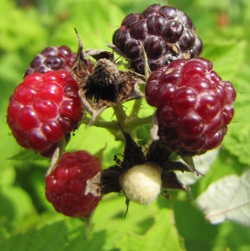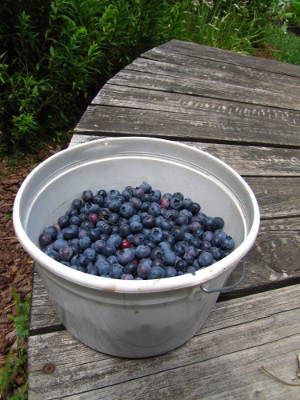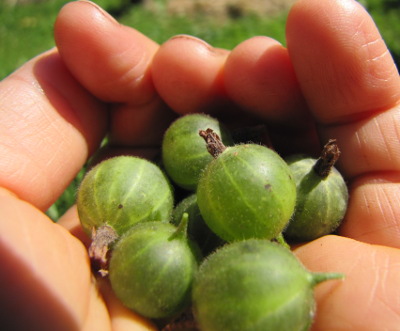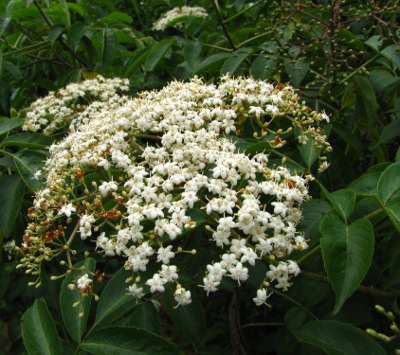
Easy bush and bramble fruits
 If the endless talk of pests
and disease in the rest of The
Holistic Orchard
didn't scare you away, you probably felt the same relief I did when you
hit the Berries chapter. Not only do many brambles and bush
fruits bear much sooner than trees, they also tend to be more resistant
to problems, allowing you to make selections based on taste and
regional location.
If the endless talk of pests
and disease in the rest of The
Holistic Orchard
didn't scare you away, you probably felt the same relief I did when you
hit the Berries chapter. Not only do many brambles and bush
fruits bear much sooner than trees, they also tend to be more resistant
to problems, allowing you to make selections based on taste and
regional location.
I've written extensively
about brambles in Weekend
Homesteader: February,
and Phillips agrees with me on most points. Blackberries and
raspberries are easy and delicious --- select among the many varieties
based first on your growing zone and you'll be golden.
 Blueberries
are tougher for those of us without highly acidic soil, but Phillips
offers some fascinating holistic advice there. First, he reminds
us that the main issue with alkaline soil is that it makes iron less
available to the blueberry roots, which tend to hunt for minerals right
at the mulch/soil interface. So adding greensand (rich in iron),
acidifying sources of nitrogen (such as cottonseed meal), old nails, or
sulfur (for fast acidification, in
a pinch) right below the mulch is much more effective than struggling
to change the pH of the whole rooting zone. Lots of organic
matter is very helpful long term too. Another issue blueberries
have with high pH is excess calcium blocking their taste for magnesium,
which can be fixed by boosting levels of the latter. Finally, if
you don't live too far north, southern highbush blueberries or (even
better) rabbiteye
blueberries are less
sensitive to high pH.
Blueberries
are tougher for those of us without highly acidic soil, but Phillips
offers some fascinating holistic advice there. First, he reminds
us that the main issue with alkaline soil is that it makes iron less
available to the blueberry roots, which tend to hunt for minerals right
at the mulch/soil interface. So adding greensand (rich in iron),
acidifying sources of nitrogen (such as cottonseed meal), old nails, or
sulfur (for fast acidification, in
a pinch) right below the mulch is much more effective than struggling
to change the pH of the whole rooting zone. Lots of organic
matter is very helpful long term too. Another issue blueberries
have with high pH is excess calcium blocking their taste for magnesium,
which can be fixed by boosting levels of the latter. Finally, if
you don't live too far north, southern highbush blueberries or (even
better) rabbiteye
blueberries are less
sensitive to high pH.
 Gooseberries
and currants don't
like high heat, but that same personality trait makes them some of the
few fruits that will produce in the shade. We chose gooseberries
in our garden since we like fresh fruits much more than preserves, but
jelly-eaters might prefer currants. Disease is more likely to be
a problem with these plants than with other small fruits, though, so
select carefully to ensure you get both resistance and flavor.
Gooseberries
and currants don't
like high heat, but that same personality trait makes them some of the
few fruits that will produce in the shade. We chose gooseberries
in our garden since we like fresh fruits much more than preserves, but
jelly-eaters might prefer currants. Disease is more likely to be
a problem with these plants than with other small fruits, though, so
select carefully to ensure you get both resistance and flavor.
Interestingly, Phillips
doesn't throw in many unusual fruits, but does devote a whole section
to elderberries. I think this choice is due to his wife's
profession (herbalism) and to elderberries' healing powers. In
our garden, wild elderberries come up everywhere, and I mostly root
them out, but I have let one shrub grow up beside our biggest
peach. The bush attracts lots of pollinating insects, but the
fruits didn't pass my raw taste test.
 Meanwhile, I was sad to see
that Phillips skipped grapes --- they're not technically berries, but I
could have used some holistic advice about these fungus-prone
fruits. And I think strawberries merit a place even if they're
not woody plants --- they certainly bear like crazy with few issues.
Meanwhile, I was sad to see
that Phillips skipped grapes --- they're not technically berries, but I
could have used some holistic advice about these fungus-prone
fruits. And I think strawberries merit a place even if they're
not woody plants --- they certainly bear like crazy with few issues.
Which fruits did you
wish had made the cut? Do you find some of the small fruits
listed more or less hardy than Phillips suggested?
I appreciate you all
hanging in there through a mind-bending couple of months considering
fruit trees. Those of you who haven't been reading along might
want to check out older posts about beginning
a holistic orchard, techniques
for designing a holistic orchard, orchard
soil health, managing
fungi in the orchard, disease-resistant
pears, and no-spray
stone fruits.
Meanwhile, the consensus
is for Joel Salatin's Folks,
This Ain't Normal to
be our next book club read. We'll skip Thanksgiving week, then
dive right into chapters 1 through 3 on November 28. Salatin is
bound to provoke lots of opinions, whether you agree with him or not,
so be sure to find a copy so you can join in the discussion!
Want more in-depth information? Browse through our books.
Or explore more posts by date or by subject.
About us: Anna Hess and Mark Hamilton spent over a decade living self-sufficiently in the mountains of Virginia before moving north to start over from scratch in the foothills of Ohio. They've experimented with permaculture, no-till gardening, trailersteading, home-based microbusinesses and much more, writing about their adventures in both blogs and books.
Want to be notified when new comments are posted on this page? Click on the RSS button after you add a comment to subscribe to the comment feed, or simply check the box beside "email replies to me" while writing your comment.

I'd like to read (at least, since probably I can't grow, with limited space) about successful cranberry growing, also maybe some of the prairie berries (or Scandinavian berries, which might be in the NW) like, maybe, cloudberries and whortleberries.(also, only read of, never tasted!) Even tho these all need distinctive growing conditions, I wonder if anyone has adapted their conditions, to suit them?
and whortleberries.(also, only read of, never tasted!) Even tho these all need distinctive growing conditions, I wonder if anyone has adapted their conditions, to suit them?
btw, Anna--in your mention of raspberries and blackberries, what about the lovely black-raspberries (thimbleberries, to Yankees)?
Mom --- Steve and Maxine tried the dryland cranberries that you see in seed catalogs now and then. After a few years, they pulled them out because they didn't really produce. I still think of trying them myself, but that does make me think twice.
Black raspberries are definitely in the raspberry group I talk about being easy.
I also would have liked to see more on other fruits - like the entire list in the last chapter that he does not have details on, and also strawberries and grapes. Maybe citrus too! A book like this on nut trees is another one I'd snap up.
General comments, I wish I'd had this book before I planted 80% of what I have I would not have gotten dwarf apples, and different varieties of most of what I planted. I also would have liked to see a little less emphasis on spraying, and more on fruit tree guilds and other means of creating happy trees. Overall, I am glad to have this book. I'll be reading it over and over again!
I would not have gotten dwarf apples, and different varieties of most of what I planted. I also would have liked to see a little less emphasis on spraying, and more on fruit tree guilds and other means of creating happy trees. Overall, I am glad to have this book. I'll be reading it over and over again!
BTW, got your book this week!!! It looks great, so excited to dig in!
De --- You might enjoy some of Lee Reich's books to hear more about a wide range of other fruit (and nut) plants. Reich's advice is more conventional, but he will help you select some intriguing varieties and species Phillips left out.
I totally agree with you about wishing I'd read this book before I chose my trees. I can't believe I didn't select a single disease-resistant peach!
Thanks so much for getting my book! I really appreciate it!!
Cranberries - Same here ("here" being Japan, BTW)... we had a few cranberries planted in a corner, but they never produced enough berries to persuade us to plant more. Eventually rooted them out and used that space as a planting bed for hardwood cuttings.
Boysenberries - Cane berries are one of our favourite groups of fruits and we've been growing raspberries for a long time (mainly because they are so easy to grow, to the point of being a weed nuisance), but about 5 or 6 years ago a neighbour gave us some boysenberry seedlings and, after a slow start, they have become our new favourites. They are succulent, juicy and very tasty and, because the core of the fruit stays in the berry when picked, have a much better shelf life than fresh rasps. They stand up to the heat and high humidity of a Japanese summer somewhat better than the rasps, too. The down side is that boysenberries don't make such tasty jam as raspberries. So we still grow rasps, but mostly for jam making, while the boysenberries are the ones that go on top of the breakfast cereal on those early summer mornings (ah, bliss!).